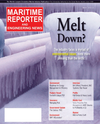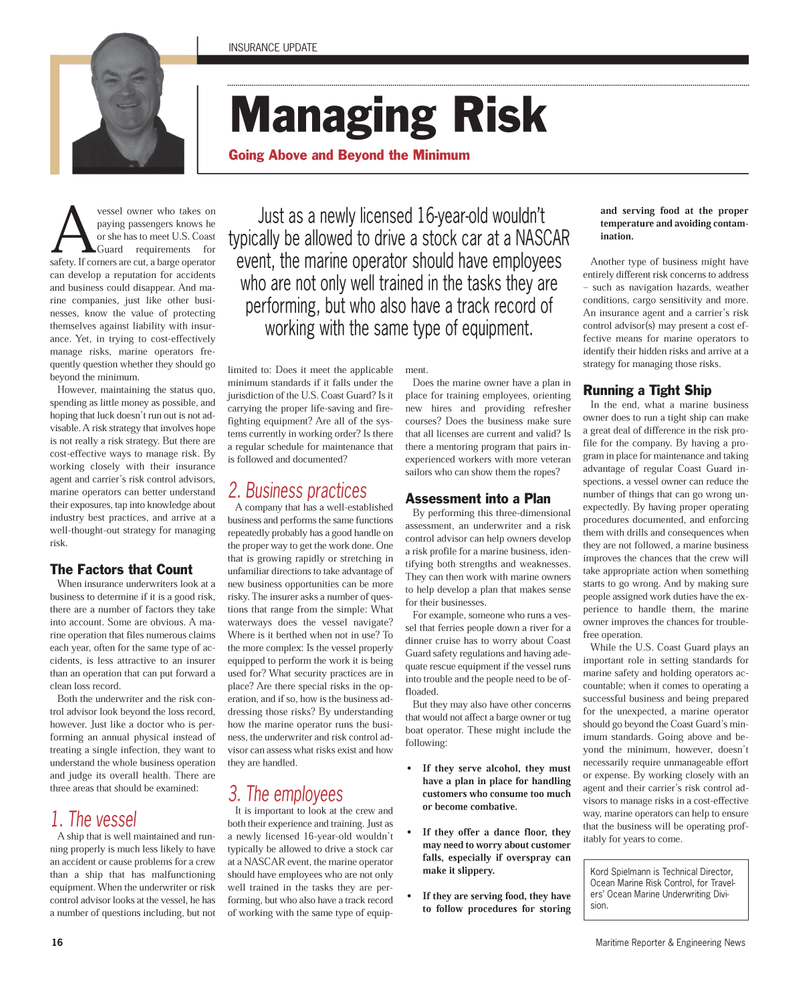
Page 16: of Maritime Reporter Magazine (May 2012)
The Green Ship Edition
Read this page in Pdf, Flash or Html5 edition of May 2012 Maritime Reporter Magazine
16Maritime Reporter & Engineering News Avessel owner who takes on paying passengers knows he or she has to meet U.S. CoastGuard requirements forsafety. If corners are cut, a barge operator can develop a reputation for accidents and business could disappear. And ma- rine companies, just like other busi- nesses, know the value of protecting themselves against liability with insur- ance. Yet, in trying to cost-effectively manage risks, marine operators fre-quently question whether they should go beyond the minimum. However, maintaining the status quo, spending as little money as possible, and hoping that luck doesn?t run out is not ad- visable. A risk strategy that involves hope is not really a risk strategy. But there are cost-effective ways to manage risk. By working closely with their insurance agent and carrier?s risk control advisors, marine operators can better understandtheir exposures, tap into knowledge about industry best practices, and arrive at a well-thought-out strategy for managing risk.The Factors that CountWhen insurance underwriters look at abusiness to determine if it is a good risk, there are a number of factors they take into account. Some are obvious. A ma- rine operation that files numerous claims each year, often for the same type of ac- cidents, is less attractive to an insurer than an operation that can put forward a clean loss record. Both the underwriter and the risk con-trol advisor look beyond the loss record, however. Just like a doctor who is per- forming an annual physical instead of treating a single infection, they want to understand the whole business operation and judge its overall health. There are three areas that should be examined: 1. The vesselA ship that is well maintained and run-ning properly is much less likely to have an accident or cause problems for a crew than a ship that has malfunctioningequipment. When the underwriter or risk control advisor looks at the vessel, he has a number of questions including, but not limited to: Does it meet the applicableminimum standards if it falls under the jurisdiction of the U.S. Coast Guard? Is itcarrying the proper life-saving and fire- fighting equipment? Are all of the sys- tems currently in working order? Is there a regular schedule for maintenance that is followed and documented? 2. Business practicesA company that has a well-established business and performs the same functions repeatedly probably has a good handle onthe proper way to get the work done. One that is growing rapidly or stretching in unfamiliar directions to take advantage of new business opportunities can be more risky. The insurer asks a number of ques- tions that range from the simple: What waterways does the vessel navigate? Where is it berthed when not in use? To the more complex: Is the vessel properly equipped to perform the work it is being used for? What security practices are in place? Are there special risks in the op- eration, and if so, how is the business ad- dressing those risks? By understandinghow the marine operator runs the busi- ness, the underwriter and risk control ad-visor can assess what risks exist and how they are handled. 3. The employeesIt is important to look at the crew and both their experience and training. Just as a newly licensed 16-year-old wouldn?t typically be allowed to drive a stock car at a NASCAR event, the marine operator should have employees who are not only well trained in the tasks they are per- forming, but who also have a track record of working with the same type of equip- ment. Does the marine owner have a plan in place for training employees, orienting new hires and providing refresher courses? Does the business make sure that all licenses are current and valid? Is there a mentoring program that pairs in-experienced workers with more veteran sailors who can show them the ropes? Assessment into a PlanBy performing this three-dimensionalassessment, an underwriter and a riskcontrol advisor can help owners develop a risk profile for a marine business, iden- tifying both strengths and weaknesses.They can then work with marine owners to help develop a plan that makes sense for their businesses. For example, someone who runs a ves- sel that ferries people down a river for a dinner cruise has to worry about Coast Guard safety regulations and having ade- quate rescue equipment if the vessel runs into trouble and the people need to be of-floaded. But they may also have other concerns that would not affect a barge owner or tug boat operator. These might include the following: If they serve alcohol, they must have a plan in place for handling customers who consume too muchor become combative. If they offer a dance floor, they may need to worry about customer falls, especially if overspray can make it slippery. If they are serving food, they have to follow procedures for storing and serving food at the proper temperature and avoiding contam- ination.Another type of business might have entirely different risk concerns to address ? such as navigation hazards, weather conditions, cargo sensitivity and more. An insurance agent and a carrier?s risk control advisor(s) may present a cost ef-fective means for marine operators to identify their hidden risks and arrive at a strategy for managing those risks. Running a Tight Ship In the end, what a marine business owner does to run a tight ship can make a great deal of difference in the risk pro- file for the company. By having a pro- gram in place for maintenance and takingadvantage of regular Coast Guard in- spections, a vessel owner can reduce the number of things that can go wrong un-expectedly. By having proper operating procedures documented, and enforcingthem with drills and consequences whenthey are not followed, a marine business improves the chances that the crew will take appropriate action when something starts to go wrong. And by making sure people assigned work duties have the ex- perience to handle them, the marineowner improves the chances for trouble- free operation.While the U.S. Coast Guard plays animportant role in setting standards formarine safety and holding operators ac-countable; when it comes to operating asuccessful business and being prepared for the unexpected, a marine operator should go beyond the Coast Guard?s min- imum standards. Going above and be- yond the minimum, however, doesn?t necessarily require unmanageable effort or expense. By working closely with an agent and their carrier?s risk control ad- visors to manage risks in a cost-effective way, marine operators can help to ensure that the business will be operating prof- itably for years to come.INSURANCE UPDATE Managing RiskKord Spielmann is Technical Director, Ocean Marine Risk Control, for Travel- ers? Ocean Marine Underwriting Divi-sion. Going Above and Beyond the MinimumJust as a newly licensed 16-year-old wouldn?t typically be allowed to drive a stock car at a NASCARevent, the marine operator should have employeeswho are not only well trained in the tasks they are performing, but who also have a track record of working with the same type of equipment. MR May 12 # 2 (9-16):MR Template 4/24/2012 4:46 PM Page 16

 15
15

 17
17
